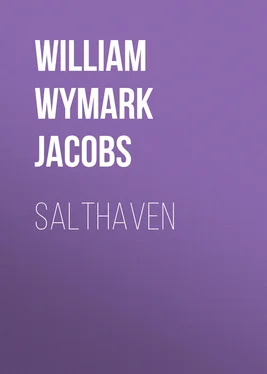William Wymark Jacobs - Salthaven
Здесь есть возможность читать онлайн «William Wymark Jacobs - Salthaven» — ознакомительный отрывок электронной книги совершенно бесплатно, а после прочтения отрывка купить полную версию. В некоторых случаях можно слушать аудио, скачать через торрент в формате fb2 и присутствует краткое содержание. Жанр: foreign_prose, foreign_antique, на английском языке. Описание произведения, (предисловие) а так же отзывы посетителей доступны на портале библиотеки ЛибКат.
- Название:Salthaven
- Автор:
- Жанр:
- Год:неизвестен
- ISBN:нет данных
- Рейтинг книги:3 / 5. Голосов: 1
-
Избранное:Добавить в избранное
- Отзывы:
-
Ваша оценка:
- 60
- 1
- 2
- 3
- 4
- 5
Salthaven: краткое содержание, описание и аннотация
Предлагаем к чтению аннотацию, описание, краткое содержание или предисловие (зависит от того, что написал сам автор книги «Salthaven»). Если вы не нашли необходимую информацию о книге — напишите в комментариях, мы постараемся отыскать её.
Salthaven — читать онлайн ознакомительный отрывок
Ниже представлен текст книги, разбитый по страницам. Система сохранения места последней прочитанной страницы, позволяет с удобством читать онлайн бесплатно книгу «Salthaven», без необходимости каждый раз заново искать на чём Вы остановились. Поставьте закладку, и сможете в любой момент перейти на страницу, на которой закончили чтение.
Интервал:
Закладка:
"My father?" said Miss Hartley, in a small but determined voice.
Mr. Vyner gazed at her in a preoccupied fashion. Suddenly his face changed.
"Good gracious! yes," he said, springing up and going to the door. "How stupid of me!"
He stepped into the corridor and stood reflecting. In some circumstances he could be business-like enough. After reflecting for three minutes he came back into the room.
"He will be in soon," he said, resuming his seat. Inwardly he resolved to go and fetch him later on—when the conversation flagged, for instance. Meantime he took up his papers and shook his head over them.
"I wish I had got your father's head for business," he said, ruefully.
Miss Hartley turned on him a face from which all primness had vanished. The corners of her mouth broke and her eyes grew soft. She smiled at Mr. Vyner, and Mr. Vyner, pluming himself upon his address, smiled back.
"If I knew half as much as he does," he continued, "I'd—I'd–"
Miss Hartley waited, her eyes bright with expectation.
"I'd," repeated Mr. Vyner, who had rashly embarked on a sentence before he had seen the end of it, "have a jolly easy time of it," he concluded, breathlessly.
Miss Hartley surveyed him in pained surprise. "I thought my father worked very hard," she said, with a little reproach in her voice.
"So he does," said the young man, hastily, "but he wouldn't if he only had my work to do; that's what I meant. As far as he is concerned he works far too hard. He sets an example that is a trouble to all of us except the office-boy. Do you know Bassett?"
Miss Hartley smiled. "My father tells me he is a very good boy," she said.
"A treasure!" said Robert. "'Good' doesn't describe Bassett. He is the sort of boy who would get off a 'bus after paying his fare to kick a piece of orange peel off the pavement. He has been nourished on copy-book headings and 'Sanford and Merton.' Ever read 'Sanford and Merton'?"
"I—I tried to once," said Joan.
"There was no 'trying' with Bassett," said Mr. Vyner, rather severely. "He took to it as a duck takes to water. By modelling his life on its teaching he won a silver medal for never missing an attendance at school."
"Father has seen it," said Joan, with a smile.
"Even the measles failed to stop him," continued Robert. "Day by day, a little more flushed than usual, perhaps, he sat in his accustomed place until the whole school was down with it and had to be closed in consequence. Then, and not till then, did Bassett feel that he had saved the situation."
"I don't suppose he knew it, poor boy," said Joan.
"Anyway, he got the medal," said Robert, "and he has a row of prizes for good conduct. I never had one; not even a little one. I suppose you had a lot?"
Miss Hartley maintained a discreet silence.
"Nobody ever seemed to notice my good conduct," continued Mr. Vyner, still bent on making conversation. "They always seemed to notice the other kind fast enough; but the 'good' seemed to escape them."
He sighed faintly, and glancing at the girl, who was looking out of the window again, took up his pen and signed his blotting-paper.
"I suppose you know the view from that window pretty well?" he said, putting the paper aside with great care.
"Ever since I was a small girl," said Joan, looking round. "I used to come here sometimes and wait for father. Not so much lately; and now, of course—"
Mr. Vyner looked uncomfortable. "I hope you will come to this room whenever you want to see him," he said, earnestly. "He—he seemed to prefer being in the general office."
Miss Hartley busied herself with the window again. "Seemed to prefer," she said, impatiently, under her breath. "Yes."
There was a long silence, which Mr. Vyner, gazing in mute consternation at the vision of indignant prettiness by the window, felt quite unable to break. He felt that the time had at last arrived at which he might safely fetch Mr. Hartley without any self-upbraidings later on, and was just about to rise when the faint tap at the door by which Bassett always justified his entrance stopped him, and Bassett entered the room with some cheques for signature. Despite his habits, the youth started slightly as he saw the visitor, and then, placing the cheques before Mr. Vyner, stood patiently by the table while he signed them.
"That will do," said the latter, as he finished. "Thank you."
"Thank you, sir," said Bassett. He gave a slow glance at the window, and, arranging the cheques neatly, turned toward the door.
"Will Mr. Hartley be long?" inquired Joan, turning round.
"Mr. Hartley, miss?" said Bassett, pausing, with his hand on the knob. "Mr. Hartley left half an hour ago."
Mr. Vyner, who felt the eyes of Miss Hartley fixed upon him, resisted by a supreme effort the impulse to look at her in return.
"Bassett!" he said, sharply.
"Sir?" said the other.. "Didn't you," said Mr. Vyner, with a fine and growing note of indignation in his voice—"didn't you tell Mr. Hartley that Miss Hartley was here waiting for him?"
"No, sir," said Bassett, gazing at certain mysterious workings of the junior partner's face with undisguised amazement. "I—"
"Do you mean to tell me," demanded Mr. Vyner, looking at him with great significance, "that you forgot?"
"No, sir," said Bassett; "I didn't—"
"That will do," broke in Mr. Vyner, imperiously. "That will do. You can go."
"But," said the amazed youth, "how could I tell—"
"That—will—do," said Mr. Vyner, very distinctly.
"I don't want any excuses. You can go at once. And the next time you are told to deliver a message, please don't forget. Now go."
With a fine show of indignation he thrust the gasping Bassett from the room.
He rose from his chair and, with a fine show of indignation, thrust the gasping Bassett from the room, and then turned to face the girl.
"I am so sorry," he began. "That stupid boy—you see how stupid he is—"
"It doesn't matter, thank you," said Joan. "It—it wasn't very important."
"He doesn't usually forget things," murmured Mr. Vyner. "I wish now," he added, truthfully, "that I had told Mr. Hartley myself."
He held the door open for her, and, still expressing his regret, accompanied her down-stairs to the door. Miss Hartley, somewhat embarrassed, and a prey to suspicions which maidenly modesty forbade her to voice, listened in silence.
"Next time you come," said Mr. Vyner, pausing just outside the door, "I hope—"
Something dropped between them, and fell with a little tinkling crash on to the pavement. Mr. Vyner stooped, and, picking up a pair of clumsily fashioned spectacles, looked swiftly up at the office window.
"Bassett," he said, involuntarily.
He stood looking at the girl, and trying in vain to think of something to say. Miss Hartley, with somewhat more colour than usual, gave him a little bow and hurried off.
CHAPTER V
SMILING despite herself as she thought over the events of the afternoon, Joan Hartley walked thoughtfully homeward. Indignation at Mr. Vyner's presumption was mingled with regret that a young man of undeniably good looks and somewhat engaging manners should stoop to deceit. The fact that people are considered innocent until proved guilty did not concern her. With scarcely any hesitation she summed up against him, the only thing that troubled her being what sentence to inflict, and how to inflict it. She wondered what excuse he could make for such behaviour, and then blushed hotly as she thought of the one he would probably advance. Confused at her own thoughts, she quickened her pace, in happy ignorance of the fact that fifty yards behind her Captain Trimblett and her father, who had witnessed with great surprise her leave-taking of Mr. Vyner, were regulating their pace by hers.
Читать дальшеИнтервал:
Закладка:
Похожие книги на «Salthaven»
Представляем Вашему вниманию похожие книги на «Salthaven» списком для выбора. Мы отобрали схожую по названию и смыслу литературу в надежде предоставить читателям больше вариантов отыскать новые, интересные, ещё непрочитанные произведения.
Обсуждение, отзывы о книге «Salthaven» и просто собственные мнения читателей. Оставьте ваши комментарии, напишите, что Вы думаете о произведении, его смысле или главных героях. Укажите что конкретно понравилось, а что нет, и почему Вы так считаете.












